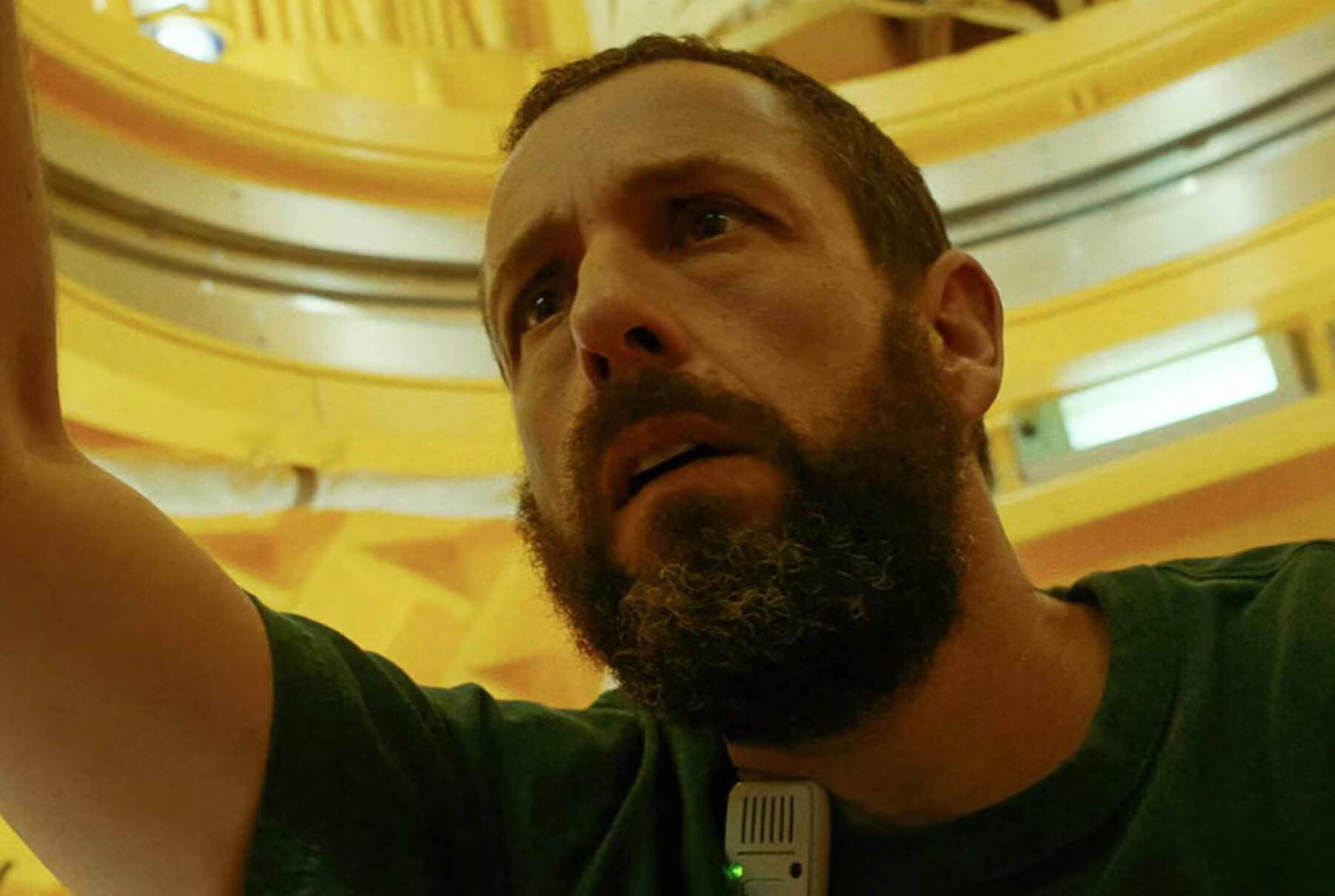Is Adam Sandler’s Kafkaesque Tarkovskyesque Kubrickesque Netflix sci-fi drama better than it sounds?
Based on a Czech novel, ‘Spaceman’ features Sandler as the titular voyager Jakub Procházka

Adam Sandler stars as the titular character in Spaceman. Photo by Netflix
Recruit the director of the Chernobyl mini series and help him get Happy Gilmore to star in a homage to Andrei Tarkovsky’s philosophical Soviet science fiction drama Solaris. It’s not an obvious recipe for success. Add in a human-sized alien spider with ESP — who may or may not be real, and whose voice sounds like the rogue computer Hal from 2001: A Space Odyssey — and director Johan Renck is in real danger of presenting a different type of disaster.
Though Adam Sandler’s acting ability is often unfairly dismissed, putting him at the heart of a meditative science fiction film where he meets exactly zero people does not play to his strengths. So, although Carey Mulligan (Lenka) and Isabella Rossellini (Tuma) play his wife and commander respectively with poise, and Kunal Nayyar plays Petr his lead liaison, they are millions of miles away and never on screen with him. That means it’s a mostly solo show that cannot — on pain of failure — provoke even a single laugh.
Based on a narrow sliver of the 2017 novel Spaceman of Bohemia by Jaroslav Kalfař, Spaceman follows the journey of Jakub Procházka as he investigates Chopra, a mysterious purple space cloud that has entered the solar system and filled the Earth’s skies. The major powers have taken a pass on this mission, so the competition is between the Czech Republic and South Korea to see who can reach Chopra first and work out what it is. As he travels to Chopra, Jakub considers his relationship with Lenka — possibly at the behest of a curious mind-reading arachnid forcing him to revisit key episodes.
It is crucial that the ship is Czech, with all the inferiority complex and political upheaval that comes with it. But explaining what it means to be from the country of Vaclav Havel, Milan Kundera, Milena Jesenská, and Franz Kafka would require too much exposition, so it is mostly scrapped. To pay for the spaceship, the Czechs needed a huge injection of corporate capital meaning that every aspect of the ship is sponsored. The novel’s mordant satire of a post-Soviet economy aping its capitalist saviors is still visible in the film, though barely. Product placements make a dark appearance. As a condition of decontaminating the ship, Jakub has to shout out to the sponsors: “Even in space don’t let germs ruin your day… Bomba away.”
The irony of Spaceman is that none of these obvious obstacles are the problem. It’s not a poor film because the epic scale and pace of Chernobyl does not work on a space ship – Renck manages the plot well. It’s not a poor film because it’s a serious psychological portrait where Adam Sandler wrestles with a CGI spider. Unexpectedly, that works well, and with pathos. No, it’s marred by being a satire whose context is entirely absent but it’s a poor film because it is a psychodrama with scant social scaffolding and an entirely weightless back story.
We neither know enough to care about Jakub, nor believe in his relationship with Lenka to worry that it might be disintegrating. Jakub and Lenka can talk on the “Czechconnect” phone as if they are on cell phones, though only at set times. During Jakub’s four-month journey to the cloud though, Lenka, who is pregnant, has become disillusioned with their marriage and wants out. ” For mission reasons, Petr and Tuma want Lenka to patch things up so Jakub is not distracted as he reaches the critical part of the trip, but Jakub dwells guiltily on how he has broken promises in the relationship. Even this trip to the stars is an example of him abandoning her.
As he nears Chopra, Jakub gets more perturbed. He discovers, or imagines, a wise old representative of a telepathic arachnid species hiding in his spaceship. Jakub names it Hanuš after the clockmaker reputed to have made the astronomical clock in Prague. In a rare case of movie alien arthropods turning out to be friendly, Hanuš is one of the more effective elements of the film. In fact, the term of address Hanuš uses for Jakub — “skinny human” — is one of the memorable phrases from the film. As the film progresses, the term undergoes a series of subtle modulations, depending on the context. By the end, it becomes a reassuring mode of address, with an implied note of fondness, a far cry from its initial use when it marked the human from the alien, the hairy from the smooth.
While the young Jakub resembles Franz Kafka and Hanuš is a direct allusion to the insect of “Metamorphosis” — the alien is nothing like the animal in the Kafka short story. When Hanuš scuttles away to hide under the furniture like the “Ungezeifer” of the Kafka story, he does not do so for shame, but to avoid scaring Jakub. In fact, Hanuš behaves more like that other early 20th century Jewish Hapsburg writer Sigmund Freud, reflecting back on the memories Jakub and Lenka had together and how Jakub feels about them. To his credit Renck succeeds in deploying the arachnid as super-therapist and using space travel as intense marriage therapy.
Avoiding making a comedian laughable in a serious film though, is not sufficient to make it a success. Yet another movie about a man regretting his behavior to a wife 20 years his junior is annoying enough but a slow, thoughtful, hollow one is tedious too. Mulligan and Sandler do what they can with the script, but their union is unconvincing. Lenka is resplendent, Sandler not.
Moreover, though there are relics of family, nation, and society floating around in a scene here or there, the minimal appearances of Jakub’s pig farming forebears or the social unrest before, during and after the end of the Iron Curtain are not load-bearing. We do not know enough about the economy and the nation that built the ship to root for its success or destruction. We don’t know enough about Jakub’s family and upbringing to give richness to his current odd behavior. And, though Hanuš tries really hard to understand the context of Jakub’s marriage to Lenka, he, she, it, and we all end up thinking she’s probably better without him.
As our planet gets ever more crowded, space films about loneliness are a useful way to focus and interrogate the human condition. In recent years, The Martian and Gravity have used that trope as has Darren Aronofsky’s The Fountain. Spaceman borrows some of its more spiritual moments from the latter, using outer space as a way of talking about inner space. Sadly, though, despite putting on his weary everyman persona and beard for the serious role, Sandler cannot save the film. Even Hanuš grows tired of Jakub’s bland narcissism and speaks for the audience when he leaves, saying, “my interest in you has expired.”















